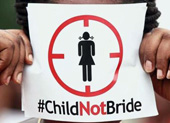
MIA launches information campaign against child marriage
By Tea Mariamidze
Tuesday, June 18
Georgia’s Ministry of Internal Affairs (MIA) has launched an 18-day campaign against child marriage, called - Do Not Deprive Children of Childhood.
The information campaign is being implemented with the support of the UN population, under the UN Joint Programme for Gender Equality.
“Our public order officers will go from door to door, deliver information brochures and booklets and inform the society that the child marriage is a crime and they should inform police about it,” Deputy Minister of Internal Affairs of Georgia Natia Mezvrishvili stated at the presentation of the campaign on June 17.
Mezvrishvili stressed the campaign aims to raise public awareness of forced marriage and the crimes that usually follow the forced marriage.
“This is sexual violence and mainly domestic violence. The victims are mostly minors, and usually, the offense is committed by family members. Although people call the police for domestic violence cases more frequently, it remains a challenge,” she added.
The deputy minister noted through the campaign MIA would like to call on the society, everyone who holds any information on such facts should report it immediately.
At the presentation, the Human Rights Protection Department of the Ministry of Internal Affairs presented the statistics about the early marriage, which reads that in 2018, an investigation was launched into 180 facts of early marriages.
As mentioned, in most cases, law enforcement agencies are informed about these facts several months later, which makes it difficult to respond adequately.
MIA says in this regard, the main challenge is the lack of public awareness, adding the information campaign aims to raise public awareness.
Georgian state laws recognize the right of individuals to enter into a marriage or make other legal decisions at the age of 18.
However, child marriages in Georgia are difficult to track because families often circumvent the law and do not officially register the marriage until they have the right to do so.
Sometimes weddings are held in rural churches or mosques, and couples are considered culturally or religiously married rather than by law.
Non-governmental and international organizations have stated many times that in general, child marriage is driven by gender inequality and the belief that girls are inferior.
A global partnership of more than 100 NGOs – Girls Not Brides says child marriage rates increased in the 1990s after the break-up of the Soviet Union when unemployment and socioeconomic hardships were common.
“Education of girls in Georgia is not valued, and some families do not see why they should pursue education when their primary role is that of a wife and mother,” the organization added.
It also says that Georgian society places a high value on virginity, adding “child marriage is sometimes used to control female sexuality and to legalize intimate relationships.”
The organization reports that in Georgia, child marriage is also driven by adolescent pregnancy, ethnicity, and self-initiation.
“Limited information about sexual and reproductive health contributes to teenage pregnancies in Georgia. According to a 2014 study, pregnant girls are more likely to marry to legitimize their pregnancies and avoid social disapproval,” Girls Not Brides says.
It also underlines that child marriage is reportedly common among national minorities, including Marneuli, a city in Kvemo Kartli predominantly populated by Georgian Azerbaijanis, who sometimes get married at the age of 14 and 15.
“Some ethnic and religious minority girls who, do not speak Georgian, struggle to integrate, and marry as an “unavoidable” destiny,” the organization reports.
Georgia has committed to eliminating child, early and forced marriage by 2030 in line with target 5.3 of the Sustainable Development Goals of the United Nations Development Programme, which aims to “Eliminate all harmful practices, such as child, early and forced marriage and female genital mutilation.”


